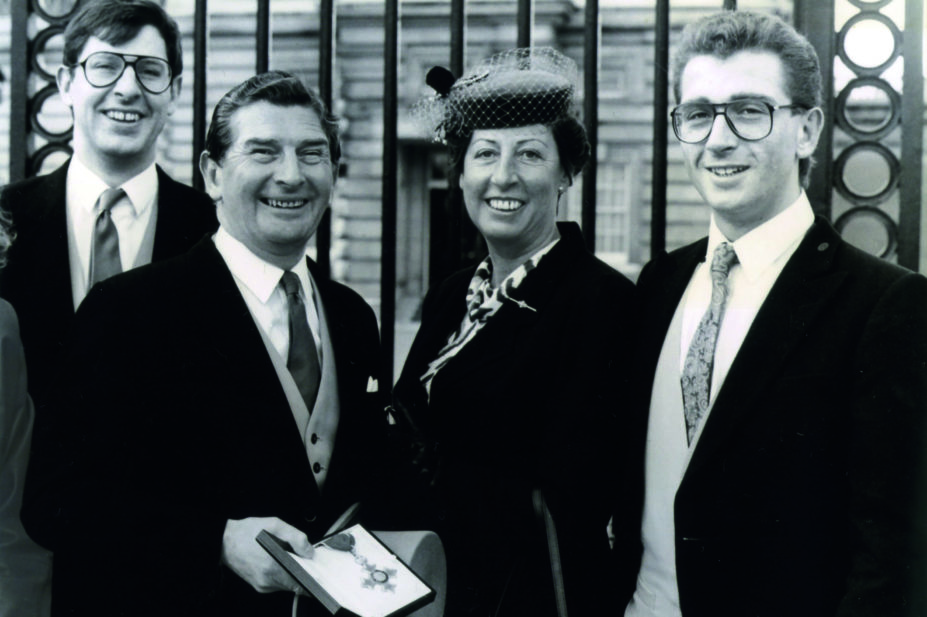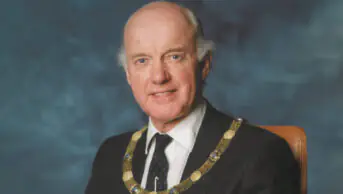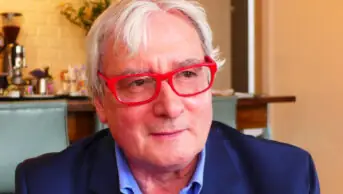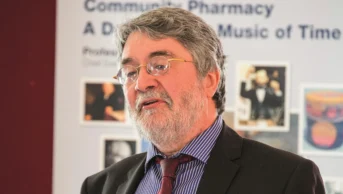
Paul Darling
William Martindale Darling, FRPharmS, who has died aged 83, was the Royal Pharmaceutical Society’s youngest ever president and its longest-serving council member. Chairing numerous health committees over five decades, Darling shaped NHS policy and brought the voice of pharmacy to the highest levels of government.
Darling — known to his friends and colleagues as Bill — was born in South Shields, Tyne and Wear, on 7 May 1934. He studied pharmacy at Sunderland Polytechnic (later the University of Sunderland), completing his postgraduate training in 1955. Following his father’s untimely death in 1956, young Darling became superintendent of JM and W Darling Ltd, the family community pharmacy business established by his great uncle, John Darling. Speaking to The Pharmaceutical Journal in 1994, Darling claimed to have pharmacy “in his blood”, and indeed, until his seventies, he could still be found working in the Chichester Corner branch of the family business.
Darling joined the Pharmaceutical Society in 1955, and in 1962 he was elected to the Society’s council — the youngest person ever to have been elected to the body. He was to remain on the council for 39 years, until 2001, becoming its longest-serving member.
Between 1971 and 1973, Darling served two consecutive terms as president of the Pharmaceutical Society. In 1972, his commitment to pharmacy was recognised with an OBE in the Queen’s Birthday Honours.
Nicholas Wood, former president of the RPS, recalls that “Bill’s strengths lay in pharmacy and health service politics and in governance”, and this is evident from the breadth of committees and groups that benefited from his leadership. For more than 25 years, between 1974 and 2002, Darling chaired the Gateshead and South Tyneside Health Authority, incorporating the merger of South Tyneside and Gateshead health authorities in 1994. For his services, Darling was made a CBE in the 1988 New Year’s Honours list.
Sir Liam Donaldson, chief medical officer for England between 1998 and 2010, remembers Darling as “a major figure in the development of the NHS in the north east of England in the 1990s — a time of tumultuous change. As one of the health authority chairmen, he was a wise and strong leader, whom as Regional Director of the NHS, I came to rely on and respect enormously. When I became chief medical officer, I found his insights on national health policy equally shrewd and helpful.”
Wood echoes Darling’s significance in this role: “Having a pharmacist in such influential positions in the health service was of huge importance, and showed that pharmacists could and should take roles in the wider NHS.”
Over the same period, between 1974 and 2001, Darling also chaired the standing pharmaceutical advisory committee, which advised the Department of Health on pharmacy.
In 1990, Darling became the inaugural chair of the National Association of Health Authorities and Trusts (now the NHS Confederation), a post he held until 1993. He appointed Philip Hunt, later Lord Hunt of Kings Heath, as director of the association. “I have known and worked with Mr Darling over many years, first in his chairmanship of the National Association of Health Authorities, and subsequently in my time as a health minister,” says Lord Hunt, who speaks of Darling as a “friend and distinguished colleague”.
Hunt recalls that “as chairman of the National Association of Health Authorities, Mr Darling brought his management expertise to the fore and was hugely important in developing the reputation and influence of the association”.
“He was utterly dedicated to the NHS and its patients. He worked tirelessly on their behalf. He was unique in holding the highest office in both the pharmaceutical profession and in NHS management.”
Darling was especially proud of his work on the 1984–1986 Nuffield Inquiry into the role of high street pharmacists, chaired by Sir Kenneth Clucas. “Bill’s appointment to the seminal Nuffield Inquiry, along with Peter Noyce, made him one of the pre-eminent voices for the future direction of pharmacy practice”, said Wood. “The results of the inquiry are much in evidence today with the vastly increased post-Nuffield emphasis on the clinical roles of the pharmacist.”
For 30 years, between 1972 and 2003, Darling led the UK delegation to the Pharmacy Group of the European Union (PGEU), serving as the group’s president between 1985 and 1986.
Throughout his career, Darling also maintained his relationship with the University of Sunderland, sitting on the University’s council between 1988 and 2003, and becoming an honorary Fellow of the University in 1990.
Wood recalls Darling as a “wily political operator, superb at debate and able to demolish woolly thinking or factual inaccuracy with aplomb”. He also describes a man with “the best interests of pharmacy and pharmacists at heart, who saw the profession as a crucial component of the health service.
“There have been few pharmacists of his influence in the broader world of the health service and he will be widely missed”.
Lord Hunt speaks equally highly of Darling’s character. “The pharmaceutical profession has lost a huge champion and the NHS has lost a very wise leader — a man of the highest integrity, admired by all who knew him.
I valued his friendship and counsel hugely. A wonderful man.”
William Martindale Darling is survived by his wife Ann, his two sons, Paul and Ian, his brother Brian, and two grandchildren.
You may also be interested in

Philip Leon Marshall Davies (1938–2026)

Bill Scott OBE (1949–2025)
